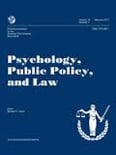 Lie detection is more effective when speakers provide statements in their nonnative language. This is the bottom line of a recently published article in Psychology, Public Policy, and Law. Below is a summary of the research and findings as well as a translation of this research into practice.
Lie detection is more effective when speakers provide statements in their nonnative language. This is the bottom line of a recently published article in Psychology, Public Policy, and Law. Below is a summary of the research and findings as well as a translation of this research into practice.

Featured Article | Psychology, Public Policy, and Law, 2017, Vol. 23, No. 3, 290-300
The Ability to Detect False Statements as a Function of the Type of Statement and the Language Proficiency of the Statement Provider
Authors
Jacqueline R. Evans, Florida International University
Pamela S. Pimentel, Florida International University
Michelle M. Pena, Florida International University
Stephen W. Michael, Whitman College
Abstract
The ability to detect deception is critical in criminal and investigative contexts. Society continues to become more diverse as international travel becomes more commonplace; as such, it has never been so essential to understand the potential impact of speakers’ language proficiency on assessing their credibility. Recently, deception researchers have turned their attention to statements provided by nonnative English speakers, thus far yielding inconsistent results. To further investigate this issue, community members, who were classified into 4 English proficiency groups (i.e., fluent, higher proficiency, medium proficiency, and lowest proficiency), provided 4 statements. These included true and false statements that were autobiographical, and true and false statements that were opinion centered. Observers rated the likelihood that these speakers were being truthful or deceptive. Observers’ accuracy and discrimination were best for the lowest-proficiency speakers; the other proficiency groups did not differ from each other. This suggests that lie detection is more effective when speakers provide
statements in their nonnative language. However, relative to fluent English speakers there was a smaller truth bias for the lowest-proficiency speakers, which suggests that if nonnative speakers provide their statements in their nonnative language they may be judged as more deceptive than their native speaker counterparts. Overall the present findings highlight the need for additional research, given the disparate results in the literature and the lack of clear policies regarding how nonnative speakers’ credibility should be assessed.
Keywords
Deception, Deception detection, Second-language speakers, Cognitive load
Summary of the Research
“[T]he ability to detect deceit is important in many contexts; no doubt this is why there has been extensive research on the topic […] However, until recently very little research had examined the ability to accurately evaluate the credibility of someone speaking a nonnative language. This is despite the large number of nonnative speakers around the world passing through border crossings, going through the resettlement process as refugees, traveling through airports, and interacting with law enforcement.” (p. 290).
“The overwhelming body of literature suggests that humans are ineffective at detecting deception; in fact, at 54% the ability of humans to detect deception is barely more accurate than predicting “heads” or “tails” during a coin toss and experts and nonexperts are similarly (in)accurate” (p. 291).
“Research suggests lying may be particularly cognitively demanding in a second language. This is likely because not only must deceivers suppress the truth and focus on appearing credible as already discussed, but they also must do so while under the burden of speaking a less familiar language.” (p.291).
“Speakers using their nonnative language may have smaller working memory spans, be slower to recognize words and make lexical decisions, provide fewer idea units when engaging in free narrative recall, and experience relatively frequent tip-of- the-tongue states. Thus, speakers who lie in their nonnative language naturally experience additional cognitive load compared to those using their first language, much like deceivers experience additional cognitive load when, for instance, they are required to tell their stories in reverse chronological order compared to those telling stories in chronological order” (p. 291).
“Degree of arousal is another element that may differ between native and nonnative speakers, in addition to degree of cognitive load experienced.” (p. 291).
“In terms of accuracy, Evans et al. (2013) reported a main effect of proficiency on accuracy such that participants were more accurate when judging statements made by nonnative speakers than native speakers” (p. 293).
Method
Participants were divided into four groups of different levels of English proficiency—fluent, higher proficiency, medium proficiency, and lowest proficiency—and provided 4 statements. These included true and false statements that were autobiographical, and true and false statements that were opinion centered. Observers rated the likelihood that these speakers were being truthful or deceptive
Results
“There were no differences in veracity ratings for true statements. However, for false statements there was an effect of language proficiency group … observers who judged the lowest-proficiency speakers were more certain that liars were lying than observers in the other three proficiency groups (which did not differ from each other). […] Speaker English proficiency is unrelated to the ability to detect true statements, but lower levels of proficiency result in lies being more easily identified. ” (p. 296).
“[Results] revealed that discrimination accuracy was higher for observers who judged the lowest English proficiency group than for those who judged the other groups (discrimination accuracy did not differ among the other three proficiency groups). “ (p. 296).
“When judging the lowest-proficiency group, discrimination was significantly greater than chance. For the medium-proficiency and fluent groups, performance was significantly less than chance. For the higher-proficiency group performance was at chance.
“Observers who evaluated the lowest-proficiency speakers displayed a significantly smaller truth bias than observers who evaluated the fluent English speakers” (p. 297).
Translating Research into Practice
“In terms of global accuracy, a low- proficiency benefit was again found, which was driven by observers’ higher accuracy at detecting lies (but not truths) in this group.” (p. 297).
“[O]bservers who judged the lowest proficiency speakers were more accurate (i.e., more likely to make a “lie” judgment) than observers who judged speakers in the other three proficiency groups (these groups did not differ from each other). ” (p. 296).
“[W]hen it comes to the detection of deception not all nonnative English speakers should be put in the same category and assumed to show the same patterns.” (p. 297).
Other Interesting Tidbits for Researchers and Clinicians
“[S]ome studies have found that speakers experience less emotional intensity when using their nonnative language compared to their native language” (p. 291).
“Lev-Ari and Keysar (2010) found that individuals with thick accents were rated as less credible than speakers without accents.” (p. 292).
“In terms of accuracy, Evans et al. (2013) reported a main effect of proficiency on accuracy such that participants were more accurate when judging statements made by nonnative speakers than native speakers” (p. 293).
“[T]he cognitive load resulting from lying and the cognitive load resulting from use of a second language may operate independently, with the effects of statement veracity observed at the conceptualization stage, and those of language proficiency observed as the statement was formulated and articulated” (p. 293).
“In terms of global accuracy, a low-proficiency benefit was found, which was driven by observers’ higher accuracy at detecting lies (but not truths) in this group. ” (p. 297).
“[R]esearchers’ focus should be on lower-proficiency speakers rather than speakers with a fairly high proficiency. In contrast, whether a statement was memory based or opinion based does not seem to be significant. ” (p. 297).
“Given that the lowest-proficiency English speakers were found to be the key group in this current study, a related area in need of additional research is the impact of interpreters in interrogation contexts, and how any consequences of using an interpreter compare to those of speaking in a native or nonnative language.” (p. 298).
Join the Discussion
As always, please join the discussion below if you have thoughts or comments to add!























